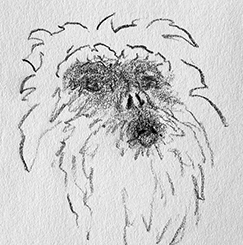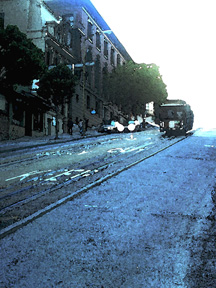Bennett
In my twenties, I loved Bennett. Bennett was a drifter who stayed with different people and traded miscellaneous services for room and board. I met him through a mutual friend and we mentally merged. Jabbering until the wee hours, we often closed down our favorite eating and drinking dives. We frequented coffee houses and bars around San Francisco. He shared unfamiliar and exhilarating intellectual adventures and suggested far-out books to read. I felt smart and alive, dressed colorfully, and felt uninhibited. I was off balance and excited, peeking out of my middle-class box. I was high on thinking. Bennett, on the other hand, was high on wine. The first hours of the day were his best. He was coherent and funny, and I loved the fearless feelings he awoke in me. We would stroll down the street, arm and arm, happy to be alive and honored to be each other’s friend. However, as each hour advanced, Bennett became progressively wasted. He was never a rowdy or mean drunk — and I drank a few glasses myself — but his thoughts and (re)actions became predictably muddied, and our conversations went from wonderful to uncomfortable. I judged him for wasting his brilliant mind. I often saw loss and confusion in his eyes; I wonder if he saw sadness and concern in mine. When I asked about his excessive drinking, Bennett bristled. “You wouldn’t like me if I were sober!” I gently told him that I already did. Bennett never came on to me and, one day, I found out why. We drove to Ocean Beach and parked, facing the sparkling water and watching the waves crash. It was early in the day and he was in fine form. |
I took the plunge. “I love you, Bennett.” He carefully considered my words and, after a long and tense silence, confessed that he was afraid this might happen. He told me that he loved me — very much — but insisted that I put this thought right out of my head. He was certain that I could never cope with his life and ways. I cried and disagreed, and we hugged for a very long time. He left town the next day. A few years later, Bennett reappeared. We greeted each other warmly and I invited him to my house for dinner. As we walked up my front steps, familiar questions flooded my mind. “Will it be the same? Does he still get drunk every day?” We walked inside my house and he sat in his usual spot at my kitchen table. We immediately reconnected, and the warmth of familiar friendship and wonderful conversation filled the room. By the time we finished dinner, he morphed into his drunken self and asked if he could sleep on my couch. I looked into his sleepy and near-crossed eyes, and then down at the floor. “I’d rather you didn’t.” Bennett looked at me with disbelief. “I really can’t stay here? Just for tonight?” “No.” After a few awkward, silent moments, he slowly descended the front stairs, steadying himself with the handrail, and looked back up at me. I’ll never forget his sloppy, puzzled, hurt expression. He turned and stumbled down the street, shoulders slumped forward, head down. It was one of the hardest things I ever did. I never saw Bennett again. © 2012 Joanne Shwed “Vanishing Point” photo courtesy of Thomas A. Ekkens |


















































